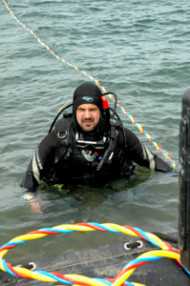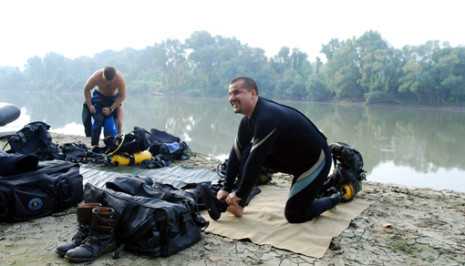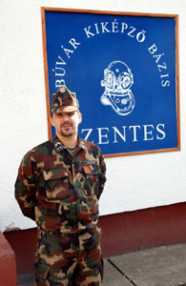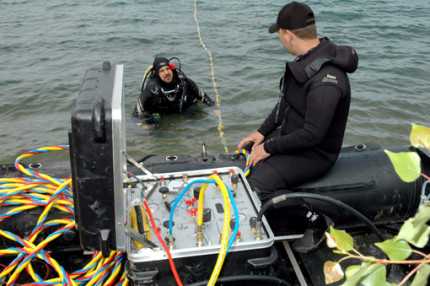The Hobbies of a Master Diver: Diving and Teaching
Szöveg: László Szűcs | 2008. április 30. 6:46I have known Sergeant-Major Róbert Márton for years. Being a journalist covering various training courses organised for military divers I had a chance to met him nearly every occasion, be it the training pool of the diver training centre at the Szentes barracks, at the bank of the Holt-Tisza near Csongrád, or on the azure waters of the lakes of Nyékládháza, created in the location of former mines.
I have noted one of the characteristics of the young warrant officer serving at HDF 37th ‘Ferenc Rákóczi II’ Engineering Battalion as soon as we got acquainted, since every time he insisted on staying in the background, even ’flitted out’ of the photographer’s field of vision whenever he had the chance. As he told me repeatedly, he didn’t care much about ’taking pictures of himself’, he is focusing on his job instead. Though it took some time to convince him, this time I’ve managed to record our conversation, the apropos of which is the fact that the young warrant officer is the only Master Diver in the Hungarian Defence Forces at the moment. Nevertheless, the conversation starts slowly, as usual …
I’m told that anybody who wants to be a military diver must enroll a basic course first, where he can get the so-called Third Class Diver title. After a while and following the fulfilment of certain criteria the soldier becomes a Second Class Diver, and later a First Class Diver. In order to obtain the Master Diver qualification, one must have at least 10 years’ of active work experience.

Naturally, Sergeant-Major Márton would like to get to the Master-level, but he confesses that he has to wait and study for a few more years for this qualification. Nevertheless, his current qualification enables him to instruct any kind of diver training within the HDF, meaning that besides the basic training, he can support Third and Second Class Divers in preparing for a higher qualification, moreover, he is a permanent instructor of regular diver instructor, diver leader, and underwater salvage/rescue trainings, as well.
"For me the instructors’ training is the biggest challenge, where I have to teach divers who have several years’ professional experience. Luckily enough, they accept what I tell them, since they know that I always make every effort to transfer my skills" – says Róbert Márton. At the moment, the Sergeant-Major is the Squad Commander of the Diver Training Base of the Garrison Support Company of the Szentes Corps. He’s been a contracted soldier for 13 years now, but he mastered the basics of diving 15 years ago, because he wanted to serve as a diver while in the HDF.
In the past years he rose gradually through the ranks and participated in several real life missions, during which he had to search for objects lost in the River Tisza, or even clues, upon the request of the Police. On other occasions, he was searching for corpses of drowned people in the deep. He remembers his first such job clearly: the task was to take the corpse of a 15-year-old boy out of the Holt-Tisza near Csongrád.

Róbert has completed numerous special military diving tasks in the last decade. For instance in 1998 he was serving in the Hungarian Engineering Contingent within SFOR for 6 months as a diver. In 2004 he participated in the demolition of the Doboj Bridge. One of the most extreme experiences of Sergeant-Major Márton’s career is linked to this task, completed in Bosnia-Herzegovina, as in the course of the demolition works the River Bosna often ’produced’ 2 m/sec currents, making every activity a lot more difficult for divers.
In addition to the abovementioned, the young warrant officer took his fair share of the national military diver activities, as well, for example in February 2006, he participated in the blasting of ice at Tiszalök, where military divers had to destroy the ice barrier which endangered the hydropower plant. The Sergeant-Major tells me, that besides real life missions, he likes training drills the most. He instructs the participants of various training courses together with assistant instructors trained by him, and performs regular training dives in the Holt-Tisza near Csongrád, or at the lakes nearby Nyékládháza. On average, he spends a minimum of 200 hours underwater per year.

Speaking about his future plans the only Master Diver of the HDF told me that he would like to teach as long as it is possible, but now it seems that he has an opportunity for that only until 2010, when his present contract will terminate and – in line with the regulation on promotion in force – he cannot fulfil his current position any longer. In other words he has to pursue his military career at another unit, or he has to discharge from the HDF. Therefore Róbert and his commanders have requested the competent persons to qualify his position a special one so that he could carry on serving as a diver instructor. This is quite a ‘burning question’ since once he has to leave his current position, the HDF will not have any military diver instructors, because the legal provisions in force stipulate that in order to pursue this activity, one must have a class B instructor qualification at least. And in two years’ time no military diver will have this qualification yet …
At the end of our discussion Róbert also tells me that he is interested in the activities of sports divers, without a doubt, and would endeavour to dive in the oceans, but unfortunately, he doesn’t have the necessary financial background at the moment. It is quite obvious for him that he dives a lot ’outside the barracks’, too, since in his free time he is employed as a contracted diver.
